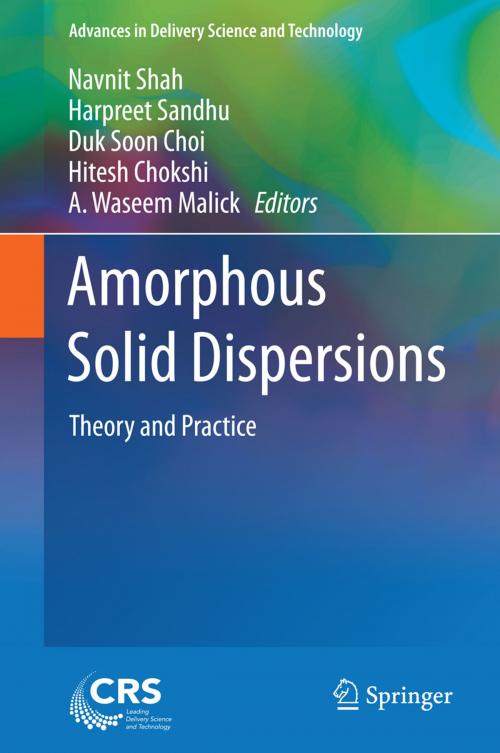Amorphous Solid Dispersions
Theory and Practice
Nonfiction, Health & Well Being, Medical, Specialties, Pharmacy, Science & Nature, Technology, Engineering, Chemical & Biochemical| Author: | ISBN: | 9781493915989 | |
| Publisher: | Springer New York | Publication: | November 21, 2014 |
| Imprint: | Springer | Language: | English |
| Author: | |
| ISBN: | 9781493915989 |
| Publisher: | Springer New York |
| Publication: | November 21, 2014 |
| Imprint: | Springer |
| Language: | English |
This volume offers a comprehensive guide on the theory and practice of amorphous solid dispersions (ASD) for handling challenges associated with poorly soluble drugs. In twenty-three inclusive chapters, the book examines thermodynamics and kinetics of the amorphous state and amorphous solid dispersions, ASD technologies, excipients for stabilizing amorphous solid dispersions such as polymers, and ASD manufacturing technologies, including spray drying, hot melt extrusion, fluid bed layering and solvent-controlled micro-precipitation technology (MBP). Each technology is illustrated by specific case studies. In addition, dedicated sections cover analytical tools and technologies for characterization of amorphous solid dispersions, the prediction of long-term stability, and the development of suitable dissolution methods and regulatory aspects. The book also highlights future technologies on the horizon, such as supercritical fluid processing, mesoporous silica, KinetiSol®, and the use of non-salt-forming organic acids and amino acids for the stabilization of amorphous systems.
Amorphous Solid Dispersions: Theory and Practice is a valuable reference to pharmaceutical scientists interested in developing bioavailable and therapeutically effective formulations of poorly soluble molecules in order to advance these technologies and develop better medicines for the future.
This volume offers a comprehensive guide on the theory and practice of amorphous solid dispersions (ASD) for handling challenges associated with poorly soluble drugs. In twenty-three inclusive chapters, the book examines thermodynamics and kinetics of the amorphous state and amorphous solid dispersions, ASD technologies, excipients for stabilizing amorphous solid dispersions such as polymers, and ASD manufacturing technologies, including spray drying, hot melt extrusion, fluid bed layering and solvent-controlled micro-precipitation technology (MBP). Each technology is illustrated by specific case studies. In addition, dedicated sections cover analytical tools and technologies for characterization of amorphous solid dispersions, the prediction of long-term stability, and the development of suitable dissolution methods and regulatory aspects. The book also highlights future technologies on the horizon, such as supercritical fluid processing, mesoporous silica, KinetiSol®, and the use of non-salt-forming organic acids and amino acids for the stabilization of amorphous systems.
Amorphous Solid Dispersions: Theory and Practice is a valuable reference to pharmaceutical scientists interested in developing bioavailable and therapeutically effective formulations of poorly soluble molecules in order to advance these technologies and develop better medicines for the future.















